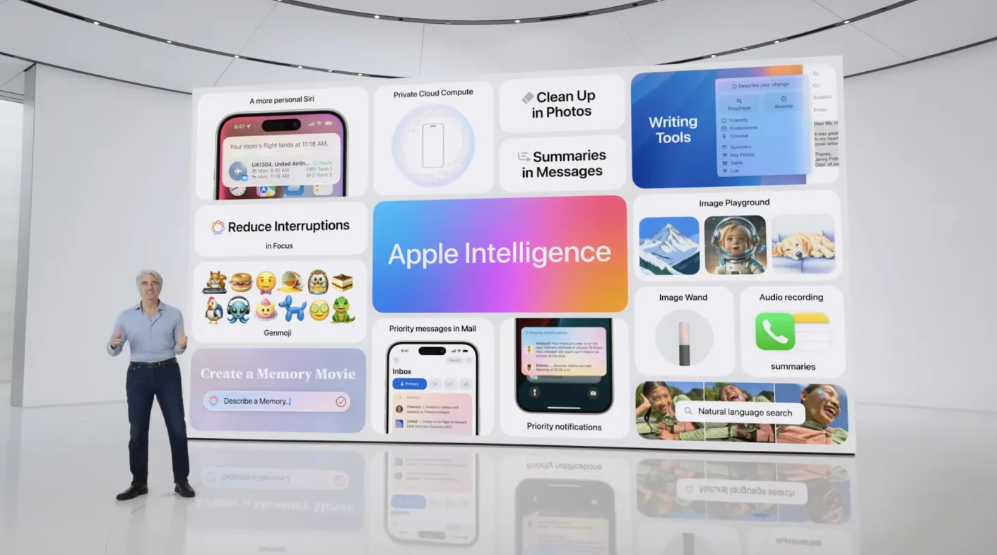 POLICY
POLICY
 POLICY
POLICY
 POLICY
POLICY
The rollout of new Apple Intelligence features coming to iPhones, iPads and Mac computers is likely to be delayed in China because of that country’s strict regulations on the use of artificial intelligence.
Apple Inc. announced the upcoming launch of its generative AI features earlier this month at its annual Worldwide Developers Conference. The features are collectively known as Apple Intelligence, and they’re said to enable capabilities such as text generation and summarization, image generation and image editing.
The Apple Intelligence features are slated to launch later in the year in markets such as the U.S. and Europe, but it’s not clear when the company might be able to bring them to its Chinese users.
A report by CNBC cites several technology industry analysts, who say that Apple is unlikely to launch its generative AI capabilities in China this year, due to the country’s restrictive laws on large language models and data privacy, and a need to find a local partner.
Several analysts believe Apple faces significant challenges in bringing AI to the Chinese market. For instance, any company that wants to offer generative AI services based on large language models in China must seek government approval first. In addition, generative AI providers in China are also responsible for taking down “illegal” content, and so Apple will need to create mechanisms to be able to do this swiftly.
It won’t be easy for Apple to navigate these rules. Many of the features in Apple Intelligence are powered by the company’s own proprietary LLMs, while others leverage the capabilities of third-party chatbots such as OpenAI’s ChatGPT. But neither Apple’s LLMs nor ChatGPT has been approved by Chinese authorities, and it seems unlikely that would happen in future.
The Wall Street Journal notes that China’s Cyberspace Administration, which governs AI in that country, requires all AI models to undergo a comprehensive “security assessment” before being launched publicly. That assessment will expect to see LLMs generating content that “reflects the core values of socialism.” In addition, the authorities will also want to check that LLMs’ content does not contain “subversion of state power.”
As of March, the CAC had approved 117 generative AI models, but not one of them was developed outside of China.
In addition, Apple would also need to bring its entire AI operations into China to adhere to local data regulations. That would mean collaborating with a third-party cloud computing infrastructure provider, which is similar to what the company already does for data stored in the Apple iCloud service.
The most obvious solution for Apple is to partner with a local technology powerhouse, and the Journal says its most likely options are Alibaba Group Ltd and Baidu Inc. While Apple has not yet confirmed any plans, the South China Morning Post said in March that the company is working with Baidu to launch its generative AI services in China. Those features will reportedly be powered by Baidu AI instead of ChatGPT and Apple’s in-house models.
But finding a local partner is only one challenge, for Apple will also need to create additional safety measures in its AI applications to prevent them from generating content that’s critical of China’s government. Apple has already designed checks that prevent its AI tools from creating copyrighted, adult and abusive content.
“Localizing the Apple Intelligence experience will be a major challenge for Apple,” CCS Insight Chief Analyst Ben Wood told CNBC. “As with all technology deployments, there are nuances to the way the service is delivered to respect the specific customs, regulations and use cases in a particular country.”
Apple is believed to be working to overcome these challenges. In an interview with Fast Company earlier this month, Apple Senior Vice President of Software Engineering Craig Federighi insisted that the company wants to find a way to bring Apple Intelligence to China, but he gave no timeline for when it might happen. “In some regions of the world, there are regulations that need to be worked through,” he said.
The iPhone maker desperately needs to launch its generative AI features in China because that country is one of its most important markets, and it’s struggling to keep pace with its competitors. In the first quarter of this year, Apple’s share of the smartphone market fell to just 15%, from 20% a year earlier, according to data from Canalys Inc. The company has faced increased competition from Huawei Technologies Co. Ltd., which has revived its smartphone business that had been crippled by U.S. sanctions.
Huawei this year managed to regain pole position as the No. 1 smartphone seller in China, thanks in part to its incorporation of new AI features. Apple’s fear is that if it doesn’t maintain parity with Huawei and other local brands, it will lose even more market share.
The Chinese rollout of Apple Intelligence will likely take some time, but Apple’s control over the hardware and software integrations in its products may mean it’s worth the wait, for that will allow it to deliver a different experience from that offered by its rivals, Wood told CNBC.
“Apple has an uncanny ability to explain its services and features better than rivals, even if it is essentially delivering the same experience or a subset of what rivals can offer,” he said. “Despite the current focus on AI by rival China-based smartphone makers, Apple should still be in a strong position.”
Support our mission to keep content open and free by engaging with theCUBE community. Join theCUBE’s Alumni Trust Network, where technology leaders connect, share intelligence and create opportunities.
Founded by tech visionaries John Furrier and Dave Vellante, SiliconANGLE Media has built a dynamic ecosystem of industry-leading digital media brands that reach 15+ million elite tech professionals. Our new proprietary theCUBE AI Video Cloud is breaking ground in audience interaction, leveraging theCUBEai.com neural network to help technology companies make data-driven decisions and stay at the forefront of industry conversations.